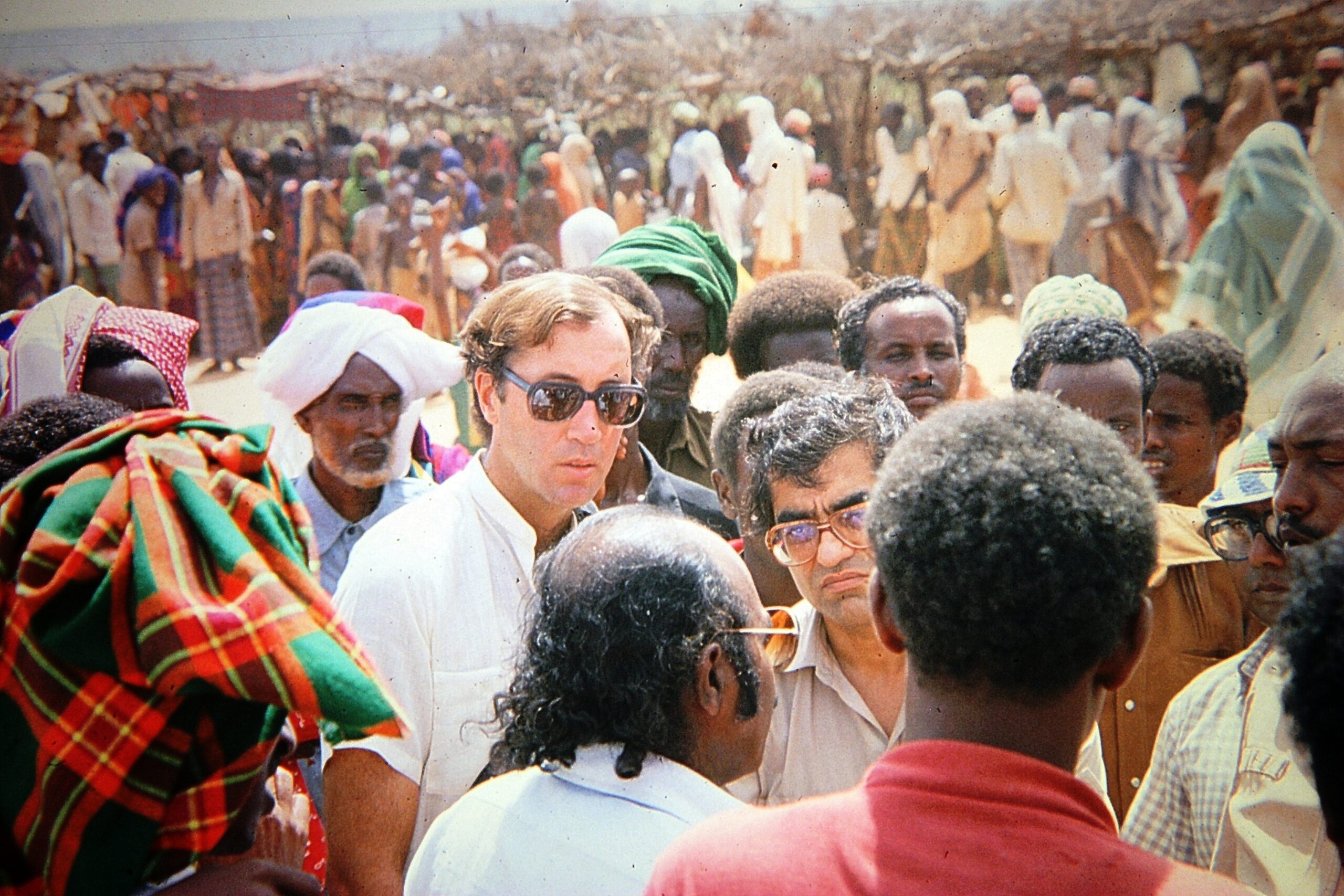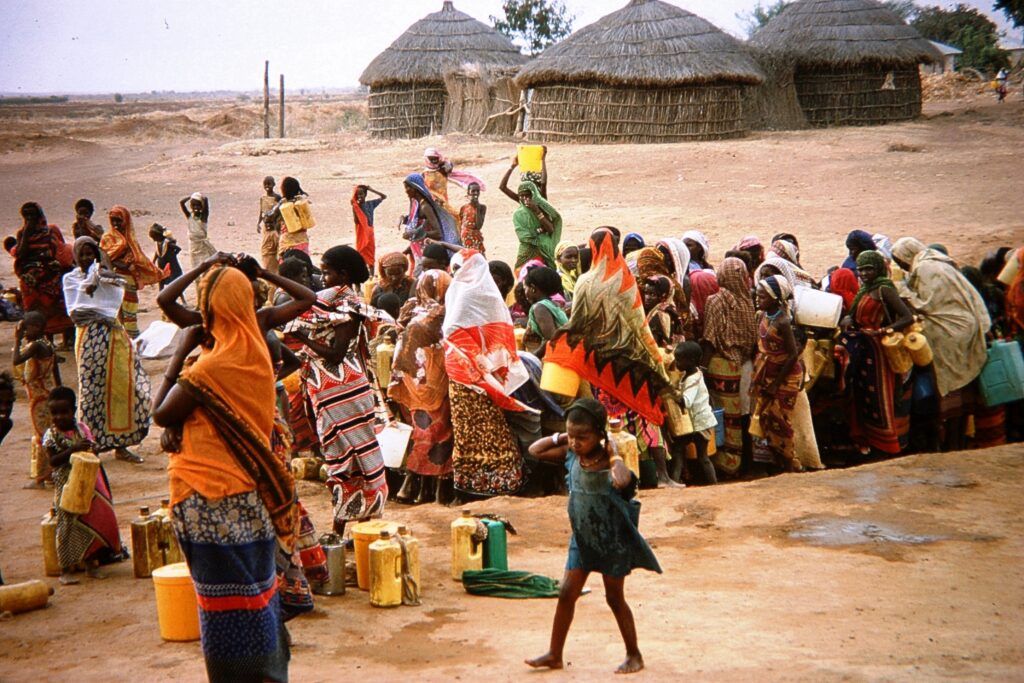Celebrating 35 Years – Art DeFerh

Art DeFehr flips through photos on his iPad—photos of time he spent in Somalia while working with the UN as high commissioner for refugees in the early 80s. He pauses and recalls a time in the camps when the military were forcibly recruiting refugees to fight their ongoing war.
“They’d come into the camps with guns and put young men on trucks. They didn’t want to go. I was in the camps one time when I saw one of these trucks so I went and stood in front of it. The military was around with their guns. I said, ‘You’re not taking them.’ We had a standoff. I made them unload. Maybe they came back later. Some people thought I was crazy but I made my point.”
Making his point has sometimes come at a cost.
“Somali government officials were not always on my side,” he says, while explaining the intricacies of navigating local politics and getting iDE’s first project approved.
But compassion, big picture thinking and the courage to stand in the line of fire—literal and figurative—have been hallmarks of Art’s ongoing humanitarian efforts for the last four decades. He shows unwavering support for ideas that have potential to shift the status quo. In Somalia, he welcomed new friend Paul Polak and former student Gerry Dyck to explore economic opportunities for refugees living in the camps. At the time, the idea of using business principles to help the poor was radical; some considered it immoral to ask those with little or no money to invest in business.
But their unlikely venture of selling donkey carts to entrepreneurial refugees was a success and began a shift in the development world—a shift away from handouts toward a model that listened to the communities that needed help and embraced them as smart, capable creators. While this first project in Somalia set the stage for what would become formally known as International Development Enterprises (iDE), the groundwork and philosophy behind it started decades before.
Early Lessons: The Road to Somalia
In the 60s while studying at a college in the US, Art marched in support of civil rights alongside Martin Luther King Jr. and protested against the Vietnam War. After graduation, he wanted to become a diplomat and had a job lined up. But his activism put him on the FBI’s radar. They created a file on him and shared it with the Canadian government.
“I had an FBI record at age 21. I thought, well, I’m not going to let you guys run my life, so I went to business school. That’s how I got into business. It was not my career choice,” Art says.
Art joined Palliser Furniture, his family’s business, where he remains president today. The business, Art says, gave him the financial independence to pursue humanitarian work. After spending five years learning the ins and outs at Palliser, he was hired by the Mennonite Central Committee to work in Bangladesh, leading a massive agricultural redevelopment project after the civil war.
Art, a Harvard Business School graduate with a research background, wanted to take a different approach to development. “I didn’t have an agricultural background but I could ask questions. I knew we had to go to the farmer, ask them what they needed and introduce things slowly,” he says. “Development at the time introduced too many things too quickly. Farmers would stand back and say, ‘Okay, you do it.’ Once the agency left, the project would collapse.”
Art and his team started with select interventions that farmers could manage and build out. His goal quickly morphed into crop diversification, which put him at odds with a government that only wanted to grow more rice. Bangladesh, healing from a war, was also experiencing famine. With some research, Art quickly figured out that more rice wasn’t going to solve that. So he and his team set out to produce other crops, which were harder to grow but would balance the Bangladeshi diet.
As punishment, the government sent them to one of the harshest parts of the country. Art welcomed the challenge and knew the level of desperation felt by those living there meant people would be responsive to change. Together with his team, they helped farmers test different crops.
“If they took care of the crops, the supplies would keep coming and they could keep the harvest. We had tremendous results. They were open to experiments on their fields. So those were early lessons for me,” Art says.
From Bangladesh, Art continued his humanitarian work in Cambodia, arriving at the end of the Khmer Rouge period. He was charged with giving supplies to the one million refugees trapped at the Cambodian border. They wanted to return home but had no means to survive.
For his part, Art created and distributed aid packages. Agricultural inputs, such as rice, were part of the packages and made it possible for people to return to their villages and start over. Art knew not everyone needed the same things but he also knew it was a good way to develop an ad hoc market. “People are smart. Once they crossed the border, they started to trade. The idea was, let people decide for themselves.”

A Guy Called Paul
While Art was working in Bangladesh and later Cambodia, Paul Polak was a psychiatrist working in Denver with homeless veterans and those with extreme mental illness, many of whom were very poor. A trip to Bangladesh inspired Paul to start working with those living on less than $1 a day. He wanted to create income opportunities for poor populations by getting them to embrace entrepreneurship.
Though their paths had yet to cross, Art considers their lives and careers a parallel development. Separate yet together. Both were successful in business and were financially independent, Art in the furniture business and Paul with his psychiatry practice, real estate and other ventures. Both valued listening to those they were trying to help. And both valued solutions that worked with the local culture.
They were eventually introduced by a mutual friend. “He would tell Paul, ‘you should meet a guy called Art.’ And he would tell me, ‘you should meet a guy called Paul.’ So one time, we were going skiing in Colorado. I called him and said, ‘I don’t know who you are Paul but we’re supposed to meet. Do you like to ski?’”
Paul did indeed like to ski and so began a lifelong friendship and Vail, Colorado became a favourite place to meet and work through issues. Not long after their first meeting, when Art was appointed UN high commissioner for refugees in Somalia, it was a natural place for them to reconnect. Paul wanted to explore ways for refugees to earn an income and Art had always supported bold ideas. Together with Gerry Dyck, they laid the groundwork for a new model of development and officially formed iDE.
Fast Forward: 35 Years Later
As of 2018, iDE’s mission to help poor communities increase their incomes and livelihood opportunities is embraced by eleven country programs across three continents, working largely in two portfolios: agriculture and sanitation. Since 1983, entrepreneurs and businesses supported by iDE have served over 30 million people. The pillars of the organization remain the same as those established in Somalia thirty-five years ago: start by listening; design solutions based on cultural context; use business principles and focus on the whole market system, not just creating a product; and measure results.
Art has earned accolades for his business acumen and humanitarian and philanthropic work, including numerous honourary degrees, the Order of Manitoba and Officer of the Order of Canada. Collectively, his travels have taken him around the world over 200 times. He has lived, worked and visited more than 130 countries and has no intention of slowing down. Of an upcoming (he insists, minor) surgery, he says, “The doctors have to work around my schedule.”
This past winter, he spent time in iDE countries—Ethiopia, Nepal, Bangladesh and Cambodia—taking stock of where the organization has been and where it’s headed. Reflecting on the last thirty-five years, Art says, “I didn’t think of iDE as something that would grow big. I was only supporting what they (Paul and Gerry) did. I’ve always supported people who have ideas. What it becomes or how big it is, is less relevant than how good you are.
It was a simple but breakthrough idea. Assume people are smart and know what will work. Let people use their skills. iDE works best when solutions are anchored in the history of people and their problems and when new ideas keep the program evolving and resilient over time.”
